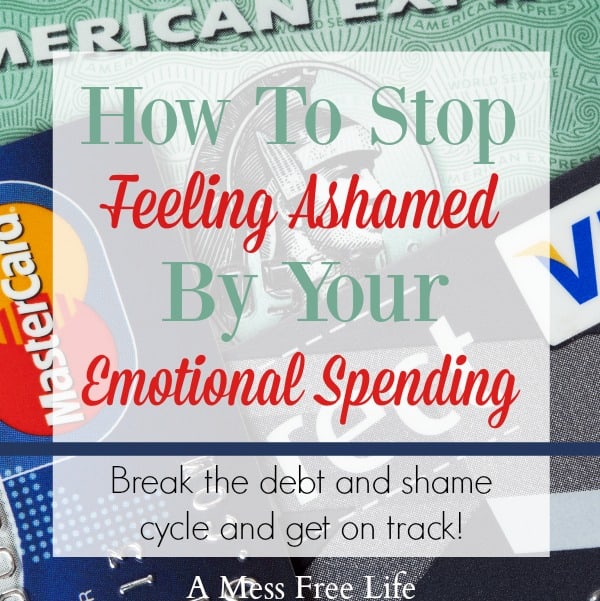A Mess Free Life may collect a share of sales or other compensation from the links on this page.
If I gave you a choice between sharing your credit score or your weight the overwhelming majority of you would instead share how much you weigh than what your credit score and overall finances look like.
The National Foundation for Credit Counseling conducted a poll asking participants to finish this sentence: “I’d be most embarrassed to admit my…” And respondents made it clear that debt shame in the United States is worse than even diet shame. Fully 37% of people answered that their credit card debt was the most embarrassing, followed by 30% of respondents admitting they wouldn’t want to fess up to their credit score. Weight came in at a measly 12% and came in at a distant third.
The average credit card debt in the United States is more than $15,000, so you’d think that debt is normalized for most of us. But despite that fact most of us have debt, we’d still like to keep our debt and credit score to ourselves. So even though we’ve all got it – we’re keeping it close to the vest and not sharing. Instead, we’re internalizing it and our left with shame.
Some might think that debt and shame is a good thing – after all, if you feel bad about it, you’re less likely to incur more, right? Unfortunately, it’s not so simple.
Shame is a great motivator when you’re a kid, and your mom is teaching you the importance of not stealing. But when you become an adult, that same shame tends to lead you into an isolated bubble. Money gets attached to shame and leads us down a path of self-destruction.
When I was first struggling with money, I didn’t want anyone to know about it. I kept my debt and shame I felt about my circumstances a secret from everyone.
I was ashamed; deeply ashamed of how I had wracked up almost 80K worth of debt because I knew I had created the financial mess and had no one to blame but myself.
But here’s one thing I’ve learned over the years as I’ve worked with women to help them break free of emotional spending– they are all in the same boat.

Table of Contents
HOW TO BREAK FREE FROM DEBT AND SHAME
There are many reasons for why people don’t want to share their secret. Maybe you can relate to one or more of these ideas.
YOU’RE AFRAID OF BEING JUDGED
In the age of social media and the amount of public shaming that goes on, this is no far-fetched notion. People are so opinionated nowadays; it’s no wonder anyone shares anything for fear of the public humiliation that might occur.
But there is a real benefit in talking with someone and telling them honestly what’s going on for you financially. If you feel that your debt is the result of a psychological impulse, you may need to talk to a mental health professional. Together, you can discuss why you might be overspending, as well as identify coping mechanisms to help retrain your behavior, so your debt doesn’t become your defining factor.
I don’t advocate sharing it on your profile page on Facebook, but I do encourage you to look for online communities that can help. Check out A Mess Free Life’s debt support group here. Remember that you’re not the first person to let your debt get out of control. Communicating with people online who have been successful in taking control helps you retain some anonymity while still getting to share your experience, get advice, and ask questions.
But you can also come clean to other people in your life. Talk to a close friend, parent, partner, or financial advisor to stop feeling guilty and start feeling like yourself again.
Our EMBRACE Program has been a fantastic resource for women who don’t feel they have the right support system to help them overcome their emotional spending and break free of the cycle of debt and shame.
YOU DON’T WANT TO LOOK LIKE A FAILURE
Who does, right? It also has to do with a level of vulnerability many people are not comfortable with. You have to be willing to expose your vulnerability to others, and that can be scary.
In the EMBRACE Program, we encourage sharing and being vulnerable because we understand that in the vulnerability is the opportunity for the most growth. When we are vulnerable, we are our authentic selves, and through this authenticity, we can create the life we want and need. As a result, our finances ended up fixing themselves.
YOU KNOW YOUR HABITS ARE DESTRUCTIVE
And, you don’t want to let others know you know this. This helps you to stay in denial and keep your head in the sand.
These seem like reasonable and legitimate reasons for not wanting to let the cat out of the bag, right? But here’s the problem…
When we keep a secret, we create a vicious, self-perpetuating cycle of secrecy and shame. By hiding our problems, we’re isolating ourselves from the people and resources that could help us. Additionally, we miss out on the opportunity to stand in our power, face our situation and resolve to make a change.
My experiences have taught me the more we isolate, the worse our situation becomes.
BREAK THE DEBT AND SHAME CYCLE AND GET ON TRACK
Understanding why you feel a certain way about money doesn’t absolve you from responsibility, but it gives you a starting point for how to deal with it. It helps you better understand why you’ve made the choices that landed you in debt thereby helping you to recognize your debt triggers so you can make better decisions going forward.
SHAME CAN ATTACH ITSELF TO MANY MONEY ISSUES
Maybe you don’t make as much money as your friends, or you have enormous debt, or you grew up poor, and you don’t want your friends to find out. Maybe you make a ton of money and don’t want others to know for fear it will change your relationships.
See how all these different scenarios lend themselves to feelings of shame?
It’s not just about debt. People have a multitude of money issues that can trigger shame in us. Learning to identify these problems and work through them is one of the best ways to break the cycle of money shame.
2. GET IT OUT IN THE OPEN
The only way to combat the secrecy, shame, debt cycle is to break it open. Don’t hide it in the corner. People are more comfortable talking about their sex lives than they are about money. How ridiculous is that?
Well, it’s because we keep our money troubles in the closet, that’s why.
I’m not suggesting you go and tell every Tom, Dick, and Harry about your money situation. I am, however, suggesting you tell at least one person. Tell your parents or a close friend. Confide in someone. Let someone in on your secret so you have someone to share your struggles and triumphs.
Pick this person carefully. You want someone who will be non-judgmental, supportive, and can relate to your feelings.
Once you do this, you’ll feel better, and you’ll have someone to talk to when you need it. So stop isolating yourself and talk to someone who fully understands this secrecy/shame cycle.
3. UNDERSTAND THE BIG 3
Brene Brown, the psychologist who studied shame and wrote the book, The Gifts of Imperfection: Let Go of Who You Think You’re Supposed to Be and Embrace Who You Are, once said “Secrecy, silence, and judgment: those are the three things shame needs to grow exponentially in our lives.”
If you continue to remain silent, hold onto your secret and tell someone who will judge instead of empathizing with you, you’ll continue to be filled with shame.
I highly encourage you to read Brene’s book as she gives you a step by step process for uncovering and working through the shame. The book will not only help you with the shame you feel around your money and debt but in other areas of your life.
4. FORGIVE YOURSELF
In almost every case, the debt was created for reasons that felt right and necessary to you at the time. Instead of blaming yourself, be honest about what your intentions were, the underlying emotions that were influencing those reasons and what you were trying to achieve with your purchases. Then let it go.
Rather than wasting time agonizing over the past, put your focus on taking action and begin reducing the debt. Your efforts will strengthen your heart and spirit to continue taking positive, proactive steps forward.
5. HAVE A DEBT PAYOFF PLAN
If you want to be debt-free, you need to stop pretending it doesn’t exist and instead, tackle it directly. This will help you feel in control and puts you in the driver’s seat of your finances. From here you can make informed, conscious choices about money.
6. FOCUS ON FIXING YOUR LIFE
In the EMBRACE Program, we spend a lot of time uncovering the reasons we overspend. What we discover is that they are all tied to unmet emotional needs. Needs that are better filled with other options besides spending money and shopping at the mall.
But often we’re so disconnected from what we want and need in our lives that it takes some digging to finally reveal it to ourselves. Once you can begin to craft your life based on what you value, the need to shop begins to diminish, and your financial situation begins to turn around and improve.
If you’re interested in learning more about the EMBRACE Program, signa up for the free online workshop below!
For now, start to identify the areas in your life where you can make some changes and begin to focus on yourself. Where you can you carve out some ME time?
Starting there will go along way in helping you get your needs met so that shopping and the debt and shame that comes along with it can finally be put to rest.
When we open ourselves up to share our secrets, shame begins to melt away leaving us the power to tackle our debt head-on.




